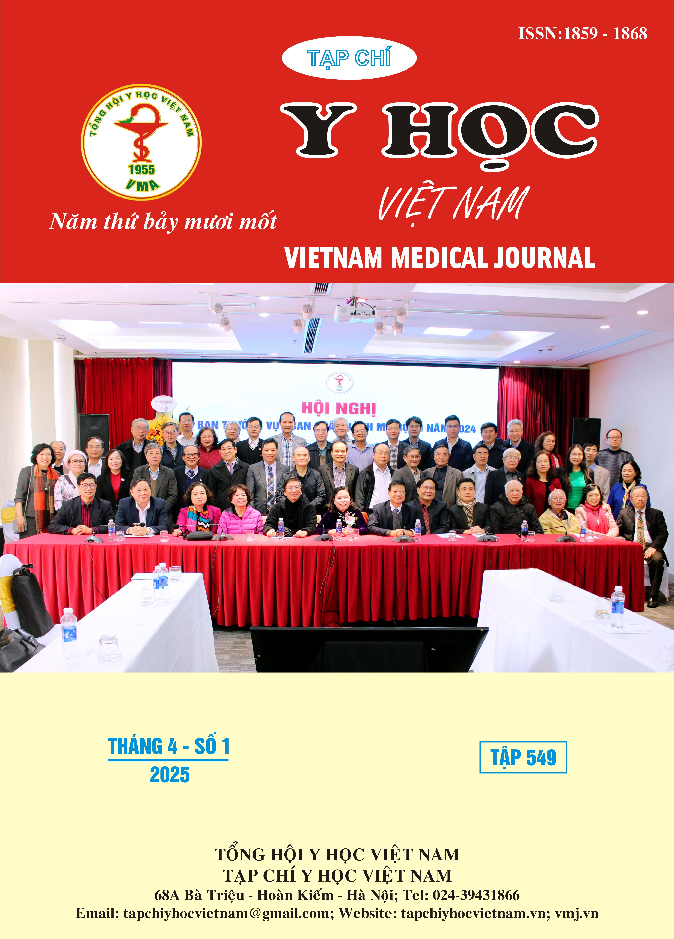IMPACT OF SAMPLE STORAGE DURATION ON ROUTINE BIOCHEMICAL TEST RESULTS
Main Article Content
Abstract
Objective: (1) To quantify the extent of changes in the results of specific biochemical tests after varying storage durations. (2) To evaluate the correlation between the degree of change in test results and the length of storage time, thereby assessing the stability of these parameters over time. Method: A cross-sectional dstudy combined was conducted using surplus specimens that had been previously analyzed in the Biochemistry Department of Bach Mai Hospital, following the directives of clinical physicians. The study included a total of 35 blood samples that were centrifuged to separate the serum. These samples were collected between February 2023 and September 2023. The inclusion criteria were samples that met the volume requirements, were free from hemolysis, and had complete test results. Samples were stored according to departmental protocols at a temperature of 2-8°C. Results: The test results after one day of storage compared to pre-storage values exhibited a decreasing degree of change in concentration, ordered as follows: K⁺, Glucose, ALT, AST, CK, Cholesterol TP, Uric Acid, Albumin, Cl⁻, and Na⁺. After two days of storage, the degree of change in concentration continued to decline in the following order: K⁺, Glucose, ALT, AST, CK, Cholesterol TP, Uric Acid, Na⁺, Albumin, and Cl⁻. After three days, the order of decreasing change was: K⁺, Glucose, AST, ALT, CK, Cholesterol TP, Albumin, Cl⁻, Uric Acid, and Na⁺. Following four days of storage, the concentration changes were noted as: K⁺, Glucose, AST, ALT, CK, Cholesterol TP, Cl⁻, Albumin, Uric Acid, and Na⁺. Blood samples stored for one to two days demonstrated minimal changes in test results compared to freshly drawn blood, with most tests showing less than a 10% variation. However, AST exhibited a significant increase after two days of storage, highlighting its sensitivity to storage duration. Conclusion: The findings of this study demonstrate that the storage duration of serum samples markedly influences the accuracy of biochemical test results. Notably, tests such as AST exhibited significant changes after just two days of storage, underscoring the potential for diagnostic inaccuracies. These results highlight the importance of adhering to established storage protocols to ensure the reliability of laboratory results. It is recommended that clinical laboratories routinely monitor the stability of test parameters and consider implementing stricter guidelines for the storage duration of serum samples. Future research should focus on the long-term effects of storage on a broader range of biochemical tests to further enhance the reliability of laboratory diagnostics.
Article Details
Keywords
Sorage time, biochemical testing
References
2. Manju Bala Pahwa*, K.Menaka, Minakshi, Manish Raj. Effect of storage time and temperature on serum clinical biochemistry analytes. BCAIJ, 9(4), 2015 [150-156]
3. Wians F.H. Clinical laboratory tests: Which, why, and what do the results mean? Lab. Med. 2009;40:105–113.
4. Ignatowicz A. Biobanki—wyłaniające się narzędzie badawcze ku lepszej wiedzy dotyczącej zdrowia ludzkiego i chorób. Biobanks—Emerging research tool in advancing our understanding of human health and diseases. Pomoc Rozw. 2014;2:4–12. (In Polish)
5. Lippi G., Becan-McBride K., Behúlová D., Bowen R.A., Church S., Delanghe J., Grankvist K., Kitchen S., Nybo M., Nauck M., et al. Preanalytical quality improvement: In quality we trust. Clin. Chem. Lab. Med. 2013; 51:229–241.
6. Plebani M. The detection and prevention of errors in laboratory medicine. Ann. Clin. Biochem. 2010;47:101–110.
7. Gernand W. Wskaźniki jakości w laboratoryjnej diagnostyce medycznej. Quality indicators in laboratory medical diagnostics. Diagn. Lab. 2011; 47:39–43. (In Polish)
8. Pietruczuk M., Bartoszko-Tyczkowska A. Laboratory Diagnostics. In: Neumeister B., Besenthal I., Böhm B.O., editors. Klinikleitfaden Labordiagnostik (Clinical Guide) Elsevier Urban&Partner; Wrocław, Poland: 2013. (In Polish).


